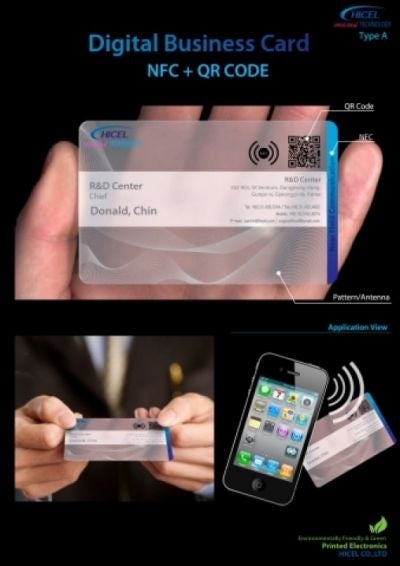The Independent's journalism is supported by our readers. When you purchase through links on our site, we may earn commission.
Business cards go digital and NFC-enabled

With the advent of social networks, smartphones and applications like Bump that wirelessly share contact information between devices, technology-savvy businesspeople have started leaving their business cards in their briefcase.
A Korean company called Hicel believes that the physical business card still has a place in our modern society, it just needs a little push into the future.
Hicel has started producing the world's first mass production type NFC business cards, equipping them with an NFC (near field communication) chip, QR code and smart features.
Business cards are "an indispensable communication tool" in Asian countries and are not likely to be discontinued any time soon.
Hicel's digital business cards bring paper cards into the paperless world by facilitating the digital exchange of contact details. Using the NFC or QR code technology, contact information on the card can be wirelessly transmitted to a smartphone.
The cards also provide additional space to store large amounts of data (such as links to a website, email address, social networks, and personal biographies) that would be too cumbersome to fit on a traditional card.
Hicel is not the only company trying to move the idea of business cards into the future. According to this YouTube video, American company Cisco is also working on the idea of NFC-enabled business cards.
Social network LinkedIn is built around the concept of contact sharing for business use. Online business card websites such as Retaggr aim to regroup all your online profiles into one easily readable digital business card.
Smartphone application Bump lets users "bump" their phones together to swap contact information, photos or calendar events.
Smartphone users that have to bridge the gap between digital business cards and traditional business cards might want to have a look at applications such as ScanBizCards, SnapDat or Google Goggles, applications that use OCR (optical character recognition) to convert information on the card into contacts on the phone.
Don’t have a smartphone? Products like the NeatDesk desktop scanner or the Dymo CardScan take the hassle out of digitizing all the business cards you have collected over the years by quickly scanning them and using OCR to enter the information into a computer database.
Join our commenting forum
Join thought-provoking conversations, follow other Independent readers and see their replies
Comments
Bookmark popover
Removed from bookmarks